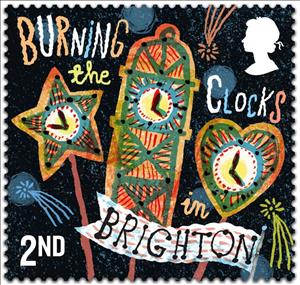Stamp: Burning The Clocks, Brighton (United Kingdom of Great Britain & Northern Ireland 2019)
Burning The Clocks, Brighton (United Kingdom of Great Britain & Northern Ireland 2019)
09 July (United Kingdom of Great Britain & Northern Ireland ) within release Curious Customs (2019) goes into circulation Stamp Burning The Clocks, Brighton face value 2nd No Face Value
| Stamp Burning The Clocks, Brighton in catalogues | |
|---|---|
| Michel: | Mi: GB 4414 |
| Stanley Gibbons: | Sg: GB 4239 |
Stamp is horizontal format.
Stamp from se-tenant pair. Face value of £0.61 on day of issueAlso in the issue Curious Customs (2019):
- Se-tenant - Horn Dance/Bog Snorkeling face value 2*1.60;
- Se-tenant - Cheese Rolling/Halloween face value 2*1.55;
- Stamp - Halloween, Derry-Londonderry face value 1.55;
- Se-tenant - Burning Clocks/Obby Oss face value 2*2nd;
- Stamp - Cheese Rolling, Cooper's Hill face value 1.55;
- Stamp - Up Helly Aa, Berwick face value 1st;
- Stamp - Oddy Oss, Padstow face value 2nd;
- Stamp - Burning The Clocks, Brighton face value 2nd;
- Se-tenant - Gurning/Up Helly Aa face value 2*1st;
- Stamp - Horn Dance, Abbots Bromley face value 1.60;
- Stamp - World Gurning Championships, Egremont face value 1st;
- Stamp - Bog Snorkeling, Llanwrtyd Wells face value 1.60;
Stamp Burning The Clocks, Brighton it reflects the thematic directions:
A clock or chronometer is a device that measures and displays time. The clock is one of the oldest human inventions, meeting the need to measure intervals of time shorter than the natural units such as the day, the lunar month, and the year. Devices operating on several physical processes have been used over the millennia.
Customs is an authority or agency in a country responsible for collecting tariffs and for controlling the flow of goods, including animals, transports, personal effects, and hazardous items, into and out of a country. Traditionally, customs has been considered as the fiscal subject that charges customs duties (i.e. tariffs) and other taxes on import and export. In recent decades, the views on the functions of customs have considerably expanded and now covers three basic issues: taxation, security, and trade facilitation
A festival is an event celebrated by a community and centering on some characteristic aspect or aspects of that community and its religion or cultures. It is often marked as a local or national holiday, mela, or eid. A festival constitutes typical cases of glocalization, as well as the high culture-low culture interrelationship. Next to religion and folklore, a significant origin is agricultural. Food is such a vital resource that many festivals are associated with harvest time. Religious commemoration and thanksgiving for good harvests are blended in events that take place in autumn, such as Halloween in the northern hemisphere and Easter in the southern.



